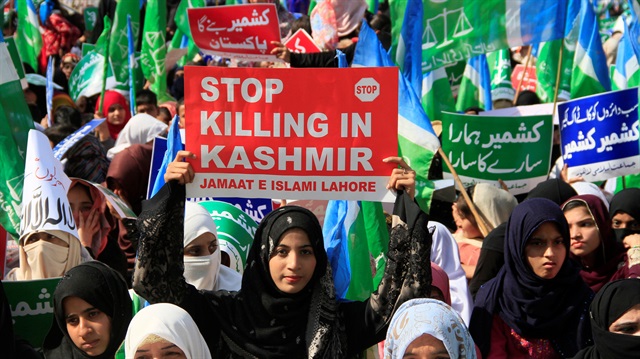

File photo
Fifth death anniversary of Guru, who was secretly executed in a Delhi prison, observed across disputed valley
Indian-held Jammu Kashmir on Friday observed a complete general strike to commemorate the fifth death anniversary of Afzal Guru, who was hanged by the Indian authorities for his alleged role in a 2001 attack on India's parliament.
The strike, called for by pro-independence leaders, was responded to by the Indian authorities with restriction on people's movement in some parts of the disputed region. Thousands of Indian troops were deployed on the streets.
Shops in major business areas were closed throughout the day, while public transportation remained absent for the most part.
Fearing protests, the government also partially suspended train services in the northern part of the Kashmir Valley.
In the run-up to the anniversary, the Indian authorities -- in hopes of preempting any protests or marches -- continued to keep the top pro-independence leaders, Syed Ali Geelani, Mirwaiz Umar Farooq, Yasin Malik under house arrest.
Guru was hanged in Delhi's Tihar Prison on Feb. 9, 2013 at the age of 43 after an Indian court convicted him of involvement in a 2001 attack on the Indian Parliament in New Delhi.
The Supreme Court had declared at the time that the "collective conscience of the [Indian] society will be satisfied only if the death penalty is awarded to Afzal Guru".
Guru was buried secretly inside the prison grounds and his family was not informed about the date of his execution.
Since his death, his family and the region’s pro-independence leadership have continued to demand Guru's remains.
Kashmir, a Muslim-majority Himalayan region, is held by India and Pakistan in parts and claimed by both in full. A small sliver of Kashmir is also held by China.
The two countries have fought three wars -- in 1948, 1965 and 1971 -- since they were partitioned in 1947, two of which were fought over Kashmir.
Kashmiri resistance groups in Jammu Kashmir have been fighting against Indian rule for independence, or for unification with neighboring Pakistan.
More than 70,000 people have reportedly been killed in the conflict since 1989. India maintains more than half a million troops in the disputed region.
#Afzal Guru
#DELHI
#KASHMIR
#TIHAR PRISON

